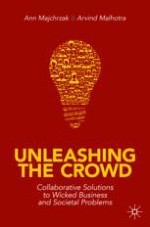2020 | OriginalPaper | Chapter
7. Practice 5: Allowing the Crowd to Play Any Innovation-Enabling Roles They Choose
Authors : Ann Majchrzak, Arvind Malhotra
Published in: Unleashing the Crowd
Publisher: Springer International Publishing
Activate our intelligent search to find suitable subject content or patents.
Select sections of text to find matching patents with Artificial Intelligence. powered by
Select sections of text to find additional relevant content using AI-assisted search. powered by
